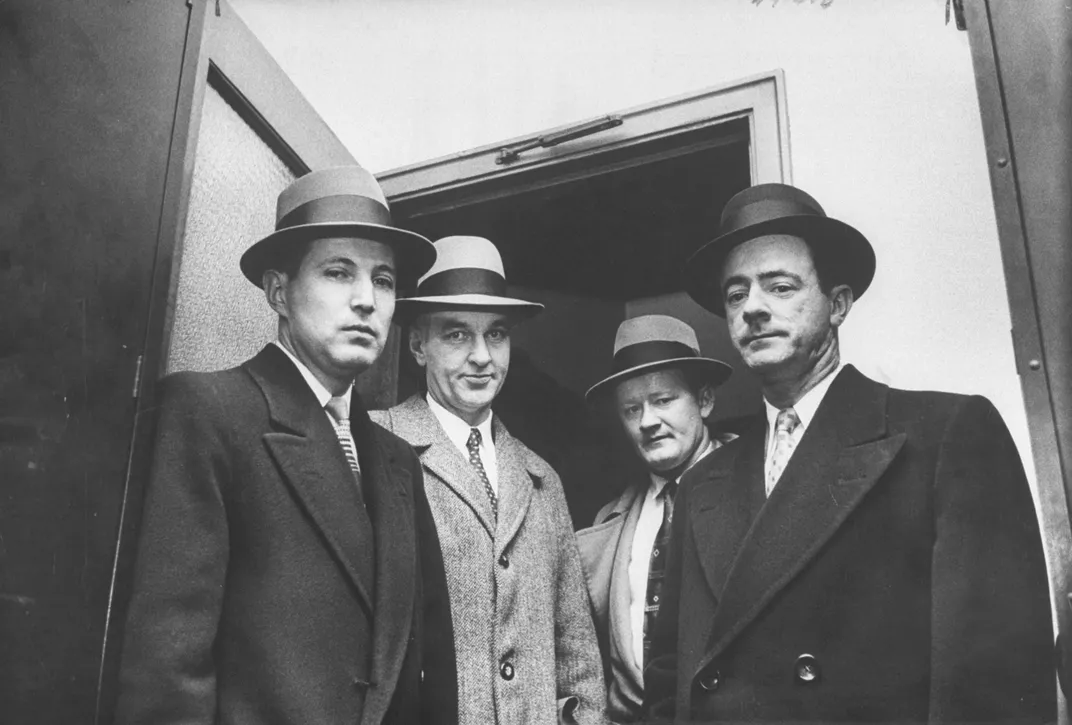BEFORE THE UNABOMBER
Unmasking the Mad Bomber
When James A. Brussel used psychiatry to think like a criminal, he pioneered the science of profiling
Michael Cannell April 2017
/https://tf-cmsv2-smithsonianmag-media.s3.amazonaws.com/filer/b2/e7/b2e7b10c-8def-4434-b9fa-0e2539b562aa/apr2017_i02_profilingcol-wr.jpg)
Scott Bakal
Shortly after lunch on a cold December morning in 1956, a trio of New York City detectives stepped out the back door of the copper-domed police headquarters looming like a dirty gray temple above the tenements and trattorias of Little Italy. Across the street, half-shrouded in winter shadow, a revolver-shaped sign hung outside John Jovino’s, the oldest gun store in the city, if not the country, where patrolmen bought the .38 Specials slung on their hips. Down the block, on the corner of Grand Street, was a German restaurant called Headquarters. Under its carved mahogany ceiling, at a long oak bar, the top brass took their off-duty rye and beer.
Today the three detectives had no time for such distractions. Led by a veteran captain, Howard Finney, they walked briskly to an unmarked police cruiser, a big green-and-white Plymouth idling at the curb, and drove south through the winding downtown streets on an urgent errand.
Four days earlier a bomb had exploded during a showing of War and Peace at the Paramount movie palace on Flatbush Avenue, in Brooklyn. At 7:50 p.m., as an audience of 1,500 gazed up at a St. Petersburg drawing room rendered in Technicolor reds and blues, a thundering detonation flashed from orchestra row GG, followed by billows of ashen smoke. Then screams filled the theater—as moviegoers glimpsed faces and scalps scythed open by shrapnel.
The Paramount blast was not an isolated event. Any New Yorker who read newspapers knew that for 16 years the police had searched for a serial bomber who identified himself only as F.P. He had planted 32 homemade explosives in the city’s most crowded public spaces—theaters, terminals, subway stations, a bus depot and a library—injuring 15.
F.P. had yet to kill, but it was only a matter of time. The New York Journal-American, an afternoon newspaper of scrappy disposition, called him “the greatest individual menace New York City ever faced.”
In all those years, a period stretching back to 1940, the largest, most formidable police force in the nation had failed to hustle up any worthy leads. Its failings were forgivable as long as the bomber crafted crude and ineffective ordnance. But by 1956 his handiwork showed a lethal new proficiency. He declared his deadly intent in letters sent to newspaper editors. Each rambling, raging letter was cryptically signed “F.P.”
Desperation drove the police to pursue a course they had never before considered in the department’s 111-year history. On that late fall afternoon Captain Finney and his two bomb squad sidekicks left headquarters to call on James A. Brussel, a psychiatrist with expertise in the workings of the criminal mind. If physical evidence could not lead the police to F.P., maybe emotional insights could. Nobody could recall an instance when the police had consulted a psychiatrist. A physical description of the bomber was unobtainable, Captain Finney reasoned, but maybe Brussel could use the evidence to draw a profile of the bomber’s inner self—an emotional portrait—that would illuminate his background and disorder. It was a radical notion for 1956.
Brussel had at first demurred, citing his workload. The New York Department of Mental Hygiene had 120,000 patients, and the caseload grew by 3,000 a year. Patient files were stacked high on his desk. In addition he shouldered a full schedule of lectures and meetings and the demands of private practice. “I had real people to deal with,” he said, “not ghosts.”
Brussel had other reservations. He hesitated to test his theories in such a high-profile case. What if his analysis failed to break the case or, worse, sent the police in the wrong direction? “I don’t know what you expect me to do,” Brussel observed skeptically. “If experts haven’t cracked this case in more than ten years of trying, what could I hope to contribute?”
In the end Brussel couldn’t resist the chance to participate in the biggest manhunt in New York history. Psychiatrists normally evaluate patients and consider how they might react to difficulties—conflict with a boss, sexual frustrations, the loss of a parent. Brussel began to wonder whether, instead of starting with a known personality and anticipating behavior, perhaps he could start with the bomber’s behavior and deduce what sort of a person he might be. In other words, Brussel would work backward by letting F.P.’s conduct define his identity—his sexuality, race, appearance, work history and personality type. And, most important, the inner conflicts that led him to his violent pastime.
Brussel called his approach reverse psychology. Today we call it criminal profiling. Whatever the term, it was still a virtually untested concept in the 1950s. Brussel’s role models at the time were fictional investigators, most notably C. Auguste Dupin, the reclusive amateur detective invented by Edgar Allan Poe in the 1840s. Dupin was the original profiler, a master channeler of the psychotic mind and the forebear of Sherlock Holmes and Hercule Poirot.
A wiry figure with a droll smile and a pencil mustache dyed to match his dark, combed-back hair greeted Captain Finney in the downtown Broadway offices of the Department of Mental Hygiene, where Brussel served as assistant commissioner. If Captain Finney was circumspect and grave, Brussel was his opposite: loud of opinion, quick-witted and manically animated.
Brussel was a dominant presence on and off duty. At parties, he was the fastest talker, the first with a one-liner, the guest most likely to seat himself at the piano for a round of show tunes.
He had composed an operetta, Dr. Faustus of Flatbush, which met a riotous reception at a psychiatric convention, and he had published psychoanalyses of Dickens and van Gogh. He saw in Tchaikovsky signs of an Oedipus complex. His analysis of Mary Todd Lincoln found her to be “psychotic with symptoms of hallucinations, delusion, terror, depression and suicidal intentions.”
Brussel had an uncommonly quick mind and a facility for interlocking clues. In the evenings, when he was finished supervising the treatment of psychotics and manic depressives in state hospitals, he sat in the upstairs office of his brick cottage on the grounds of a Queens asylum—where he lived with his wife, Audrey—and composed reams of crossword puzzles for the New York Times and Herald Tribune on graph paper he made by obsessively drawing grids on blank pages. Hour after hour he darkened the pages with words and lists of clues: goddess of peace. Neck muscle. Clusters of spores. Roman road. Honey drink. Glacial ridges. Hemingway epithet. Aesop’s race. He produced so many puzzles that he was obliged to publish under three names, lest his byline become awkwardly pervasive.
Captain Finney took a seat facing Brussel’s desk. “We’d appreciate any ideas you might have on this case, Doctor.” Finney admitted that investigators had reached a dead end.
Captain Finney emptied a satchel of evidence on Brussel’s desk. Out spilled photographs of unexploded bombs along with photostats of strangely worded letters and documentary reports amassed over 16 years. “The bombs and the letters: these were all the police had,” Brussel would write. “The rest was a mystery.”
Brussel picked through the evidence, pausing to write notes in a pad. His mind assembled the possibilities as the information accrued, drawing on psychiatric theory and probabilities. The evidence “showed one thing very plainly,” Brussel would write. “At large somewhere in New York City was a man who was quite definitely mad.”
Captain Finney “was a short, stocky man of many accomplishments and few words,” Brussel later wrote. “He was looking at me, waiting for me to say something. I was looking at the pile of photographs and letters he had tossed on my desk.”
After two hours Brussel rose from his desk and stood at a window overlooking City Hall. Seventeen stories below, the first surge of rush-hour traffic thickened with long-finned sedans and Checker cabs clogging Broadway. Streetlights winked on. Chambers Street filled with men in trench coats and brimmed hats, heads down and shoulders slouched against the cold. They moved with haste, as New Yorkers do. “Any one of the people I saw below could have been the Mad Bomber,” Brussel would write. “There was a man standing next to a car. Another man was lounging in a doorway. Another was strolling along, looking up intently at the buildings. Each of them was on these streets at that hour for some reason. Perhaps a legitimate reason, perhaps not. . . . So little was known about the Mad Bomber that virtually anyone in the city could be picked at random as a suspect. Anyone—and no one.”
The manhunt had lasted so long and had engendered so much frustration that Captain Finney and his men had come to feel as if they were chasing a specter loose in the streets. “He seemed like a ghost,” Brussel later recalled, “but he had to be made of flesh and blood. He had been born, he had a mother and father, he ate and slept and walked and talked. Somewhere people knew him, saw his face, heard his voice. . . . He sat next to people on the subways and buses. He strolled past them on sidewalks He rubbed elbows with them in stores. Though he sometimes seemed to be made of night stuff, unsolid, bodiless, he patently did exist.”
For a long moment Brussel looked as if he had slipped into a trance. While he was staring out at the strangers aswarm in the street, a detailed image of a living, breathing man took shape. He turned to Captain Finney and described his fugitive, down to the cut of his jacket.
The bomber, Brussel began, was a textbook paranoid schizophrenic. People suffering from this disorder, he explained, may believe other people are controlling them or plotting against them. They are typically reclusive, antisocial and consumed with hatred for their imagined enemies. For all their derangement, they’re capable of acting quite normal—until, inevitably, some aspect of their delusions enters into their conversation. “The paranoiac is the world’s champion grudge-holder,” Brussel would explain. “We all get mad at other people and organizations sometimes, but with most of us the anger evaporates eventually. The paranoiac’s anger doesn’t. Once he gets the idea that somebody has wronged him or is out to hurt him, the idea stays in his mind. This was obviously true of the Mad Bomber.”
The condition, Brussel said, worsened over time, progressively clouding normal logic. Most paranoids don’t become fully symptomatic until after age 35. If the bomber was about that age when he planted his first bomb, in 1940, he would now be at least in his mid-40s, probably older. His guess about the bomber’s age “could have been wrong,” Brussel acknowledged, “but, I thought, the laws of probability were on my side.” The laws of probability, or what Brussel called “inferential deductions,” played into most of his conclusions. “They are not infallible,” he said, “but neither are they mere guesses.” Like Sherlock Holmes, he was playing the odds.
Now Brussel paused, “trying to screw up the courage to articulate my next deduction.” The bomber, he continued, is “symmetrically built . . . neither fat nor skinny.” From across the desk Finney shot him a skeptical look. “How did you arrive at that?”
Brussel cited a German psychiatrist, Ernst Kretschmer, who correlated body type with pathologies. In a study of some 10,000 patients, he found that a majority of paranoids had “athletic” bodies—medium to tall with a well-proportioned frame. The probability was 17 in 20 that the bomber fell into that category.
Brussel continued: Like most paranoids, F.P. felt the need to convey his superiority. He did so with a self-righteous insistence on order. A fastidiousness verging on prissiness showed in the letters to newspapers he’d hand-printed in nearly perfect block letters free of smudges or erasures. F.P., Brussel said, “was almost certainly a very neat, proper man. As an employee...he had probably been exemplary. He had turned out the highest-quality work. He had shown up precisely on time for work each morning. He had never been involved in brawls, drunkenness or any other messy episodes. He had lived a model life—until the alleged injustice, whatever it was, had occurred.”
The same care surely applied to his grooming. “He’s probably very neat, tidy, cleanshaven,” Brussel predicted. “He goes out of his way to seem perfectly proper. . . . He wears no ornament, no jewelry, no flashy ties or clothes. He is quiet, polite, methodical, prompt.”
Captain Finney nodded. The man who had eluded him for years was coming into focus.
The bomber, Brussel continued, was afflicted by a sense of persecution caused in the formative stages of his gender development, roughly ages 3 to 6. In his young life he’d confronted the shameful knowledge of a forbidden sexual desire—most likely an erotic fixation on his mother. He protected himself from the shame and horror with a twisted bit of Oedipal logic: I desire my mother. But that’s horribly unacceptable. She’s married to my father. I’m now competing with him for her affection. I’m jealous of him. He’s jealous of me. He hates me. He persecutes me.
The original cause of the hate never surfaced in the young F.P.’s consciousness, and it gradually faded. All that remained was the sense of persecution and the searing desire for revenge.
According to Freudian theory, the Oedipus complex normally resolves itself. Most boys come to recognize that their grievance is misconceived, and they reconcile the sexual impulses that originally shamed them. But in a diseased mind such as F.P.’s, the paranoia spreads like a contagion. Any two entities with something in common would, no matter how illogically, meld into one in his mind. His sense of persecution could therefore disburse from his father to a boss, to a company, to politicians and to any organization that could plausibly symbolize authority.
To Brussel, the paranoid’s inclination to assign guilt by association explained an inconsistency that had stumped the police. In his letters the bomber had singled out Con Edison, the utility company, but he planted only the first of his bombs on Con Ed property. He would see people or organizations with the remotest connection to Con Ed as conspirators, no matter how illogical that might be. He might blame Con Ed for some unstated offense, Brussel said, “but he twists it around so that wherever a wire runs, gas or steam flows, from or to Con. Edison Co., is now a bomb target.”
F.P. seemed convinced, as a paranoid would, that a range of companies and agencies had conspired with Con Ed. By way of evidence his letters mentioned “Con Edison and the others” and “all the liars and cheats.” This, Brussel said, helped to explain why F.P. had bombed theaters and train stations. He was at war with a world colluding against him.
For the bomber, the drive for vengeance, the need to correct what’s amiss in the world, had likely assumed a religious ardor. He had, Brussel explained, formed a covenant with God to carry out a private mission of revenge, which would only make it harder to catch him. “This pact is a secret between him and God,” Brussel said. “He would never let a hint drop. Why should he ever let you catch him doing something wrong?”
Divine standing could lead the bomber to commit ever more drastic acts, Brussel warned, if the earlier blasts had not yet accomplished his goals. The bomber would feel that he possessed the righteous power to punish those who failed to accept the validity of his claims.
With godliness came omnipotence, and with omnipotence came contempt for lesser beings. The bomber’s confidence in his superiority, his arrogance would make it hard for him to hold a job. So he was likely to be, if not impoverished, then at least penurious. But even in poverty he would find a way to keep up a smart impression in his grooming and wardrobe. “He would always have to give the appearance of being perfect,” Brussel said.
The bomber, Brussel continued, almost surely operated as a lone wolf. Paranoids “have confidence only in themselves,” Brussel explained. “They are overwhelmingly egocentric. They distrust everyone. An accomplice would be a potential bungler or double-crosser.”
Brussel knew that the three detectives in his office had waged a long, frustrating manhunt. Paranoid schizophrenics, he explained, were the hardest of deranged criminals to catch because their mind splits between two realms: Even as they lose themselves in warped delusions, they continue to follow logical trains of thought and lead outwardly normal lives. They watch the world around them with a wary, distrustful eye.
“For a long while, as the three police officers sat and waited in silence, I studied the Mad Bomber’s letters,” Brussel would recall. “I lost all sense of time. I tried to immerse myself in the man’s mind.”
F.P.’s reliance on clunky, old-fashioned phrases, such as “dastardly deeds,” erratically spaced with phrases set off by dashes, suggested a foreign background.“There was a certain stilted tone in the letters, a total lack of slang or American colloquialisms,” Brussel would recall. “Somehow the letters sounded to me as though they’d been written in a foreign language and then translated into English.”
The police had long suspected F.P. was German, or of German extraction, because of his vaguely Teutonic lettering, particularly his G’s, which ended their circular form with a pair of horizontal slashes, like an equal sign. Brussel thought of the many bombings by anarchists and other radicals in Eastern Europe and said, “He’s a Slav.”
The three detectives shot Brussel a startled look. “Mind giving the reasoning behind that?” Captain Finney asked.
“Historically, bombs have been favored in Middle Europe,” Brussel answered. “So have knives.” Of course, those weapons are used throughout the world. “But when one man uses both, that suggests he could be a Slav.”
Captain Finney looked skeptical.
“It’s only a suggestion,” Brussel said. “I’m just playing the odds.”
Brussel wasn’t finished. If the bomber was a Slav, that could also be a clue to his location: Brussel flicked through the postmarks, noting that most of the letters were mailed in Westchester, the county immediately north of the city. Brussel guessed that the bomber was disguising his whereabouts by posting his letters halfway between New York and one of the industrial towns in Connecticut where Slavic immigrants had settled.
Now Brussel focused on the handwriting. The penmanship was nearly flawless, as Brussel would expect from a fastidious paranoiac. F.P. had formed almost perfectly rectilinear letters—with one exception. The W’s looked like double U’s, in a literal sense, with no overlapping diagonal arms. The sides were curved instead of straight. They also had peculiar rounded bottoms. “The misshapen W might not have caught my eye in most people’s hand-printing, but in the bomber’s it stood out. Consider the paranoiac: a man of obsessive neatness, a man who will not tolerate a flaw in what the world sees of him. If there is any little untidiness about this man, anything even slightly out of place, it catches a psychiatrist’s attention immediately.”
The W “was like a slouching soldier among twenty-five others standing at attention, a drunk at a temperance society meeting,” Brussel continued. “To me, it stood out that starkly. . . . Language is a mirror of the mind. That odd curved W had to reflect something about the Mad Bomber, it seemed to me. . . . Something subconscious had compelled the bomber to write this one particular letter in a distinctive way—something inside him so strong that it dodged or bulldozed past his conscience.”
Might the W’s resemble breasts, or maybe a scrotum? Brussel wondered. If so, had F.P. also unconsciously fashioned bombs shaped like penises? “Something about sex seemed to be troubling the bomber,” Brussel thought. “But what?” He deliberated for long moments, his eyes scanning the evidence.
He told Finney, “Sorry I’m taking so long.”
“Take all the time you want,” Finney said. “We didn’t come here expecting pat answers.”
Brussel had already established that an Oedipus complex had caused F.P. to develop into a full-blown paranoid. His Oedipal hatred for his father had spread in adulthood to a broad range of authority figures. “The bomber obviously distrusted and despised male authority: the police, his former employees at Con Ed,” Brussel would write. “To the bomber, any form of male authority could represent his father.”
Brussel now looked back through the evidence for signs of sexual disturbance. His eyes rested on photos of theater seats the bomber had slit open to secrete his explosives in a dark place. “Something about the bomber’s method of planting bombs in movie houses had bothered me since I’d read the first newspaper account years before,” Brussel would say. “There was something strange, not fully explained by the available facts.” The slashing was an uncharacteristically violent act. Everything in the evidence suggested a careful man who would avoid unnecessary risks and minimize signs of his presence. Why did he go to the trouble of slitting open seats and stuffing his bombs in the upholstery?
“Could the seat symbolize the pelvic region of the human body?” Brussel wondered. “In plunging the knife upward into it, had the bomber been symbolically penetrating the woman? Or castrating a man? Or both? . . . In this act he gave expression to a submerged wish to penetrate his mother or castrate his father, therefore rendering the father powerless—or to do both. . . . It fit the picture of a man with an overwhelming, unreasonable hatred of men in authority—a man who, for at least 16 years, had clung to the belief that they were trying to deprive him of something that was rightfully his. Of what? In his letters he called it justice, but this was only symbolic. His unconscious knew what it really was: the love of his mother.”
Brussel hesitated to explain these graphic psychiatric details to the detectives. They seemed too far-fetched. Instead he gave them a shorthand version, saying the bomber was probably unmarried and unattached—the classic loner. He was unfailingly courteous, but without close friends. “He wants nothing to do with men—and, since his mother is his love, he is probably little interested in women either.”
He was, Brussel added, “quite possibly a virgin. . . . I’ll bet he’s never even kissed a girl.” Slavs valued family ties, so he probably lived with “some older female relative who reminded him of his mother.”
A long silence followed as the detectives absorbed Brussel’s assessment. It was a lot to take in, and it may have sounded preposterous to those uninitiated in the strange ways of Freudian reasoning.
By now the shadows of the December dusk had obscured the city outside Brussel’s office window. After four hours with Brussel, the ghost in the streets had assumed human form in Captain Finney’s mind—a fastidious, middle-aged loner of Slavic descent with a history of run-ins with neighbors and colleagues. He lived in a northern suburb, probably in Connecticut, with an elderly female relative, and secretly nurtured a grudge against Con Ed and other powerful institutions.
Finney and his men put on their coats and packed the evidence. The two men shook hands, then the three detectives moved to the door. In the parting moment Brussel closed his eyes. An image of the bomber came to him with cinematic clarity. He wore outdated clothes since his contempt for others would prevent him from holding steady jobs. His attire was old-fashioned, but clean and meticulous. It would be prim, perhaps with an enveloping, protective aspect.
“Captain, one more thing. When you catch him,” Brussel said, “and I have no doubt you will, he’ll be wearing a double-breasted suit.”
Brussel added, “And it will be buttoned.”
The New York Times printed Brussel’s findings in a front-page story on Christmas Day. A few nights later the phone rang in Brussel’s Queens home. Because he treated so many violent criminals, Brussel had an unlisted number, but anybody could reach him by calling Creedmoor, the psychiatric hospital where he lived. The switchboard forwarded calls to Brussel’s home, patching in the police if the caller sounded suspicious. Brussel suspected that was the case when his phone rang at 1 a.m.
“Is this Dr. Brussel, the psychiatrist?”
“Yes, this is Dr. Brussel.”
“This is F.P. speaking. Keep out of this or you’ll be sorry.”
**********
Shortly before midnight on January 21, 1957, detectives armed with a warrant entered the home of George Metesky, a Con Edison plant worker forced to retire after toxic fumes from a furnace blast brought on a crippling case of tuberculosis.
As detectives entered the sagging three-story house near the top of a short, steep hill in Waterbury, Connecticut, they could see for themselves that Metesky matched the criteria Brussel had itemized. Metesky met them at the doorstep wearing round gold-rimmed eyeglasses and burgundy pajamas buttoned to the neck under a bathrobe. He was a thickset middle-aged man of Lithuanian descent with a history of workplace disputes. He shared the house with a pair of unmarried older sisters. He’d never married, never had a girlfriend. Neighbors described him as fastidious with a reputation for petty disputes.
In Metesky’s creepily neat bedroom, detectives found a notebook filled with handwriting similar to F.P.’s block lettering. They handed Metesky a pen and asked him to write his name on a sheet of yellow paper. They watched, spellbound, as the familiar block letters appeared on the page—the G in George had the telltale double bars. The Y had a distinctive serif.
“Why don’t you go ahead and get dressed, George,” a detective said. Here was a moment of truth. The detectives knew that Brussel had also predicted the bomber would dress in a buttoned double-breasted jacket. Sure enough, Metesky stepped from his bedroom wearing sensible brown rubber-soled shoes, red-dotted necktie, brown cardigan sweater, and double-breasted blue suit.
“Tell me, George,” a detective asked, “what does F.P. stand for?”
Metesky exhaled. His frown relaxed. “Fair play.” With those two words, barely whispered, the 17-year manhunt came to a quiet end.

When the detectives (after a 1957 arrest) nabbed Metesky, his sisters protested that "George couldn't hurt anybody." Peter Stackpole / The Life Picture Collection / Getty Images
**********
To gain footing in the ensuing years, profiling had to be sold by a performer, and Brussel knew how to put on a performance. He had a head for science and a showman’s touch. His charisma and confidence swept detectives along with him as he made nimble leaps of deduction, not to mention the FBI agents who learned at his feet. By the 1970s Brussel was known as a founding father of the emergent field of profiling. The press variously called him the “Prophet of Twelfth Street,” “Sherlock Holmes of the Couch” and “the Psychiatric Seer.”
As much as anyone, it was Brussel who united the fields of psychiatry and policing. “Those of us who were interested in combining criminology and medicine keenly followed his work,” says Park Dietz, a forensic psychiatrist who has consulted on cases including the Unabomber. Although Brussel may at times have seemed more promoter than scientist, there is no denying his accomplishments. “He made predictions with striking precision,” says psychologist Kathy Charles of Scotland’s Edinburgh Napier University. “He kick-started the police thinking that psychiatry could be an effective tool for catching offenders.”
The Metesky case, more than any other, had established Brussel as a folk hero of criminology. “At times I was almost sorry I had been so successful in describing George Metesky, for I had to live up to that success,” he later wrote. “It wasn’t always easy and sometimes it was impossible. There were times when I made mistakes. There were times when I simply lacked enough information to build an image of the criminal. There were times when the law of averages let me down: I’d diagnose a man as a paranoiac and imagine him as having a well-proportioned physique and then he’d turn out to be among the 15 percent of paranoiacs who are not so built. Yes, there were cases on which I failed. But I continued to succeed often enough so that the police kept coming to me.”
Even as he consulted with police around the country, Brussel—who would be active in the field until his death at age 77 in 1982—continued to work for the Department of Mental Hygiene. In that capacity he occasionally visited Matteawan, a Hudson Valley hospital for the criminally insane where Metesky was incarcerated. On one trip he asked to see Metesky.
It was the first and only meeting between the bomber and the psychiatrist. “He was calm, smiling and condescending,” Brussel wrote. Metesky told Brussel of his plans to be discharged and deprecated his bomb-making skills. The devices had never been powerful enough to cause much damage, Metesky claimed.
Was it possible, Brussel asked, that during all that time Metesky had actually suffered from mental illness? Was it possible that he really was a paranoid schizophrenic, as Brussel had concluded?
“He didn’t become angry,” Brussel wrote. “He was the patronizing and successful paranoiac who, as God, could appreciate and magnanimously forgive his children’s mistake. He smiled at me. With a wave of his hand he said, ‘It could have been, it could have been. But I wasn’t.’ Then he bowed graciously and left the room.”





/https://tf-cmsv2-smithsonianmag-media.s3.amazonaws.com/filer/b2/e7/b2e7b10c-8def-4434-b9fa-0e2539b562aa/apr2017_i02_profilingcol-wr.jpg)
.jpg)












